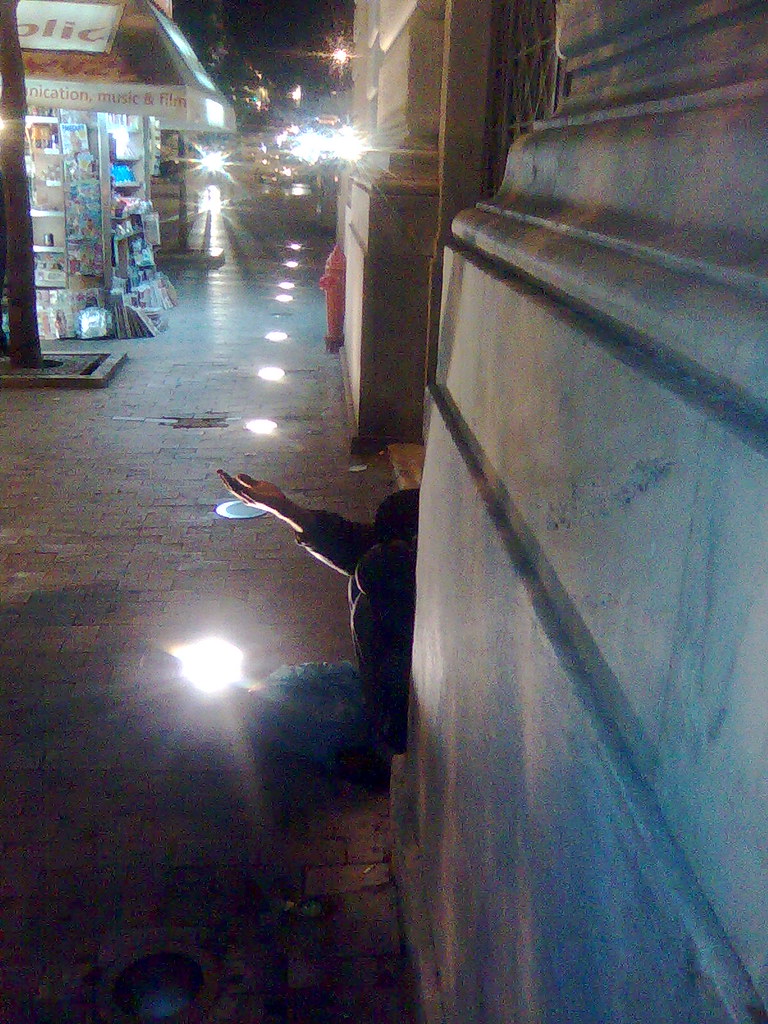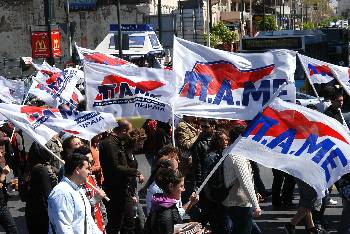 |
| A beggar in Syntagma square, Athens, 27.12.2011 |
Back to the Caves: "Dozens of homeless people in Athens will spend the Christmas holidays in the sheltering caves of Philopappou Hill, away from the rain and the cold weather.
According to two reports conducted by the Ministry of Health and the Municipality of Athens and published by Real News, there are many new age homeless, who once were businessmen and traders, and are now penniless, lying on the streets.
The shocking truth is that among those people there are families as well."
Meet the new homeless: With an average age of 47, 11% of Greece’s homeless have a university degree (!) and 23.5% hold a high school diploma, while only 9.3% are illiterate. The new Greek homeless class members have laptops and iPhones, remnants of their “old” lives. “They come to us in suits with their laptops in hand. These citizens a couple of months ago had ordinary lives. They had a job, a home and car,” says Nikitas Kanakis, the head of Doctors Without Borders in Athens. Counselors from the Department of Homeless Services describe a similar situation. “We even have homeless from suburbs like Kifisia and Voula [upper class suburbs of Athens]! They come here with their laptops and expensive smart phones they once used for their work, shocked and depressed”.
Homeless in Athens
- Hunger: Athens Mayor George Kaminis told the daily that the city's homeless had increased by around 20 per cent while queues at soup kitchens organised by municipal and church organisations were up 15 per cent."Care workers no longer meet typical homeless people, they meet a person who likely had a perfectly organised life weeks previously," said Kaminis, who has asked for additional state funding for city welfare services."We have noticed a dramatic increase in our mess halls over the recent period," added Chrysostomos Symeonidis, head of the Athens archdiocese poverty fund. "We distribute over 10,000 meals on a daily basis and 250,000 meals are given out nationwide on a weekly basis," Symeonidis said... [oh and Starvation Recipes are all the rage]
- ...hunger in the schools: “Our pupils faint due to starvation. We see our pupils coming to school with holes in their shoes. They don’t even have money to buy food from the school canteen”
- Which then leads to abandoned children: 'Propelled by poverty, 500 families had recently asked to place children in homes run by the charity SOS Children's Villages, according to the Greek daily Kathimerini. One toddler was left at the nursery she attended with a note that read: "I will not return to get Anna. I don't have any money, I can't bring her up. Sorry. Her mother."'
- The disabled are also victims of the policies pursued: "In August, a five-year-old program providing deaf people with interpreters was suspended after the government abruptly cut its funding to less than half. Overnight, 15,000 deaf people around Greece were left without help to report a crime to the police, rent a house or go to a job interview. Funding cuts have opened up gaps across welfare services, with slashed services and longer waiting times for vulnerable groups including the blind, recovering organ-transplant patients, autistic children, and paraplegics in need of physiotherapy"
- At the same time the already decrepit health system is further eroded according to The Lancet: "Overall, the picture of health in Greece is concerning. It reminds us that, in an effort to finance debts, ordinary people are paying the ultimate price: losing access to care and preventive services, facing higher risks of HIV and sexually transmitted diseases, and in the worst cases losing their lives. Greater attention to health and health-care access is needed to ensure that the Greek crisis does not undermine the ultimate source of the country's wealth—its people". Giving birth is now a luxury activity. I suppose women are expected to give birth at home by themselves - a great way to bring infant and maternal mortality to truly third world levels...
And the economy? Surely all those wizards of austerity must have improved the flailing Greek economy, raising its productivity etc. No? Well... No:
- And, desperate, people kill themselves at an unprecedented rate: "Greece's suicide rate has reached a pan-European record high, with experts attributing the rise to the country's economic crisis and painful austerity measures. Statistics from the Greek Ministry of Health show a 40 per cent rise in those taking their own lives between January and May this year compared with the same period in 2010"
- Greece: heavy industry, desperate measures to survive: Heavy industry in Greece, particularly the sectors that produce steel, concrete, aluminium, copper and paper, are desperately trying to find ways to stem some of the negative effects of the economic crisis the country is going though. Some companies even sell up to 70% of their production abroad at cost price, just to be able to keep producing... Energy-intensive industries in Greece fight a daily battle for their survival on a domestic market that has been in recession for four years, with low liquidity, limited financial resources, rising interest rates and a series of austerity measures that seem to ignore their impact on the real economy, like the high taxes on energy
Unemployment is rocketing, reaching fearsome heights:
- At the same time young (and not-so-young) Greeks are leaving the country or are planning to leave soon, the most highly educated and employable among them: "Lois Lambrianidis, an economist and geographer at the University of Macedonia in Thessaloniki, told The Australian that 9% of young Greek graduates emigrated between May 2009 and February 2010. "And in recent months, the departures are accelerating," he said, noting that Greece's population of 11 million includes about one million immigrants while the diaspora has seven million – and counting"
- While alternative local currencies have cropped-up in many towns, business is dismal, as more and more small and medium businesses go broke, and one in four shops have closed. This Christmas retail sales have dropped by 30%... So much for a festive season...
- At the same time the wealthy are jumping ship. As enormous sums of money are already out of the country, invested in property as well as deposited in banks in tax-havens around the world...
- The prospects are bleak, as the deep recession is continuing and will surely extend to 2012 (and probably beyond that if policy doesn't change) making it a five-year depression.
- The tax system has been transformed into a shifting, irrational mechanism, whose sole aim is to extract the last drop of blood mostly from those that already paid their taxes, or indeed those that were too poor to tax. The government has imposed an extra, regressive property tax, to be paid through the electricity bill, threatening to cut-off electricity to any households that can't, or refuse, to pay it. However there are so many times a vampire can feed off his victim. Already they are facing diminishing returns and a tax revolt
- Wages are slashed across the board. After cutting public sector wages anywhere from 30-60%, meaning that most doctors and teachers are paid subsistence wages, the IMF, true to its traditional "enemy of the people profile", is demanding a similar across the board cut in the private sector (what little they have left of it), in a job market where most workers are behind pay (some many months), no jobs are available and real wages are already below the official minimum wage
Things are, in other words, tough. Very tough. The kind of tough one associates with a war or a huge natural disaster. And do not think for a minute that all of this is irrelevant to you: if you live anywhere in Europe, periphery or center (but at this point probably anywhere in the Western world), this is in one form or another the future that has been prepared for you. Greece has been the canary in the coal-mine for social Europe in this crisis, a wretched and sorry bird, to begin with, admittedly, yet an indicator of the way things are going in Europe. Regardless of whether austerity is systemically viable in its own terms (it most probably isn't), the news is that the canary, is slowly yet steadily croaking. It is dying. Greek society is taking blows that will transform it for ever, in a path that no one knows where it takes and it is unraveling. So our suicides here, our untended ill, our abandoned children, our middle-class poor, our new homeless and hungry, they are an omen, a sign of things to come, across Europe. Or that seems to be the plan. The good news is that this society is taking it a lot better than some (I too) initially expected it would. Solidarity networks have cropped up all over Greece, while the support to the striking steel-workers (from Greece but not only), two months now in struggle for their livelihoods and lives, is going strong and their struggle is right now the rallying point of resistance to the destruction of all of our collective lives.
 | |||||
| High school students, express solidarity with the steel-workers after having gathered a few Euros from pocket change to contribute to the strikers fund |
An interesting thing is happening at the political level: the "unserious" Left is gaining. In a recent poll, the "electoral influence" of the three left of the mainstream parties adds up to 37% - 41 percent if one adds up the smaller parties and the Greens, a number that is unprecedented and apparently rising. Whether this will coalesce to a viable government is doubtful: The communists consider everybody else a capitalist stooge, not serious about systemic change, the Democratic Left, the right splinter group from SYRIZA, seems to be more comfortable discussing a collaboration with PASOK (assuming there will be a PASOK left by the time the elections arrive) than with everybody else. However, popular pressure can work wonders, and one still hopes that Greece will be the first to throw a political wrench in the working of the austeritarian banksters and their political employees in Europe. That is assuming that the ruling Socialist - Conservative - Far Right coalition under a former ECB vice president, actually deigns to hold elections sometime in the near future as originally promised.
The future remains at this point very opaque. The issue is whether the rest of the European peoples will need to arrive at the point of despair that Greeks have reached, before they react.













